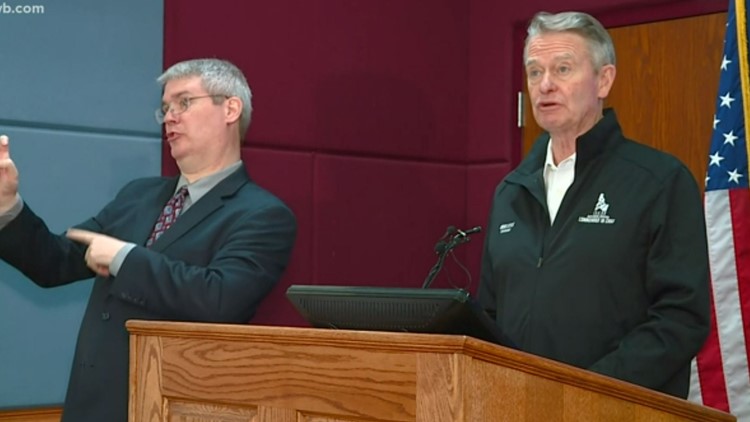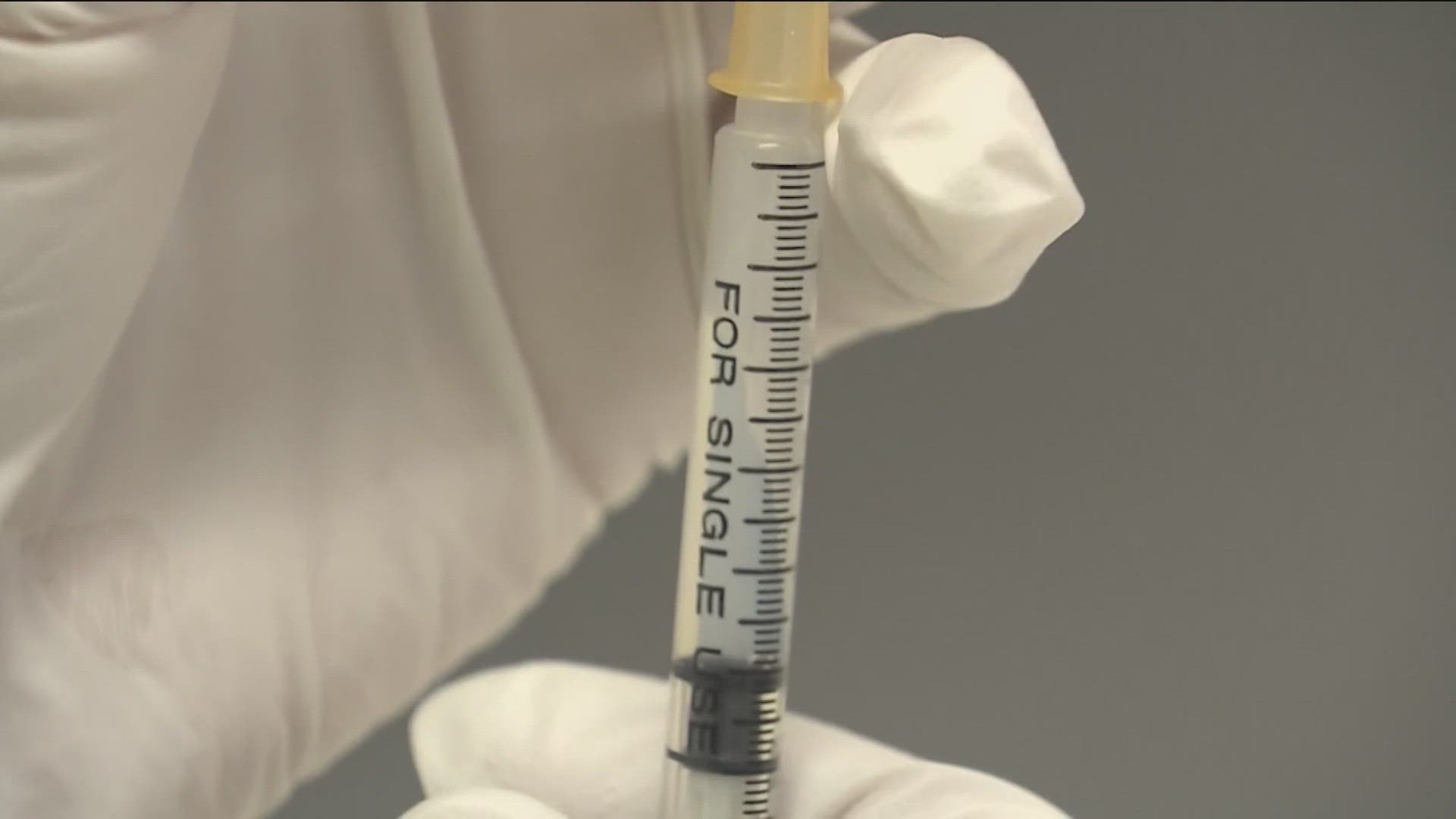BOISE, Idaho — Adams County prosecutor Christopher Boyd on Thursday sent an open letter to Gov. Brad Little, urging him to rescind his three-week stay-at-home order.
In the letter, which was also posted to Boyd's Facebook page, he argues that the order issued on March 25 infringes on Idahoans' First Amendment rights, including the rights to peacefully assemble and free exercise of religion. He also notes that he is concerned that restricting travel within the state infringes on a due process clause of the Fifth Amendment.
"I cannot in good conscience enforce it and I urge you to rescind it or let it expire on April 15, 2020, as it is currently set," Boyd wrote in the letter to the governor.
Idaho COVID-19 latest: Latest news | Map of confirmed Idaho cases | Stay-at-home order details | COVID-19 resources | Testing sites | Employers hiring | Essential business list | Closings | School closings | Help nonprofits| Golf info | Full COVID-19 coverage
"In my belief, I cannot, under my oath to uphold the constitutions of the United States and State of Idaho, charge any person with a misdemeanor under Idaho Code 56-1003(7) who has not been afforded procedural due process," Boyd wrote. "While I agree with and support taking prudent steps such as social distancing, enhanced hygiene, and voluntary stay-home advisories, we must curtail government overreach in whatsoever circumstance it presents itself."
Boyd's letter comes on the heels of similar requests by a North Idaho sheriff and lawmaker.
Rep. Heather Scott, R-Blanchard, called on residents to defy the stay-at-home order, while Bonner County Sheriff Daryl Wheeler then wrote in an open letter to the governor that the constitution was suspended and it must be reinstated in the spirit of liberty.
However, Idaho Attorney General Lawrence Wasden has said Little's stay-at-home order is legal and clearly defined by law. Idaho code gives the governor the power during a declared state of emergency to restrict the movement of people and access to businesses.
Read Boyd's full letter to the governor below:
Dear Governor Little,
I write with great concern regarding the constitutionality of your recent state-wide stay-home order. I cannot in good conscience enforce it and I urge you to rescind it or let it expire on April 15, 2020, as it is currently set. While I genuinely believe your intent is to safeguard the lives of Idahoans, the order infringes upon sacred First Amendment rights, most particularly the right to peacefully assemble as well as the free exercise of religion. It additionally infringes on rights to travel under the due process clause of the Fifth Amendment and in some cases interstate commerce under Article I section 8. Most concerningly, the order infringes on these rights without substantive or procedural due process of law.
The United States Supreme Court once noted:
The Constitution of the United States is a law for rulers and people, equally in war and in peace, and covers with the shield of its protection all classes of men, at all times, and under all circumstances. No doctrine, involving more pernicious consequences, was ever invented by the wit of man than that any of its provisions can be suspended during any of the great exigencies of government.
Ex parte Milligan, 71 U.S. (4 Wall.) 2, 121 (1866).
I believe this order effectively suspends the rights afforded under our Constitutions in the name of a "circumstance" or "exigency" in a way that was unintended by our founding fathers, as indicated above.
As you know, where the life, liberty, or property of any person is impaired, the government must afford substantive and procedural due process. Substantive due process, or the propriety of seeking to impair those rights, is questionable under the current circumstances.
While the Centers for Disease Control and Prevention (CDC) originally predicted that COVID-19 might infect up to 214 million people this year and kill as many as 1.7 million, that number has repeatedly been revised downward. Dr. Anthony Fauci, the government's foremost infection disease expert, later predicted "that 100,000 and 200,000" deaths could occur." More recently Dr. Fauci has revised his estimate to 60,000.
In a population of 350 million, 60,000 deaths present less than a .017% death rate due to COVID-19. In a country where almost 3 million persons die for any number of reasons each year, this death rate does not warrant trampling upon sacred constitutional rights. Because these deaths do not even rival those of heart disease (more than 500,000 per year), the order currently violates substantive due process.
Moreover, the state-wide order violates procedural due process on an individual level by its overbreadth. I believe that each citizen affected by the stay-home order has the right to due process before denial of constitutional rights. In such a proceeding, it would be the burden of the government to show exigent circumstances (e.g. that the citizen is actively contagious) before restricting that person's freedom. "The fundamental requirement of due process is the opportunity to be heard "at a meaningful time and in a meaningful manner."" Mathews v. Eldridge, 424 U.S. 319, 333 (1976). To my knowledge, no Idahoan has been given such an opportunity to be heard in such meaningful ways before the deprivation of their individual liberties here. Because of this, your order violates procedural due process.
The order invokes the emergency powers of the governor and Idaho Code 56-1003(7) to self-isolate the entire population of Idaho (with exceptions). While this emergency power may afford you some rule-making authority, procedural due process must be afforded each citizen before their constitutionally protected rights to assemble, exercise religion, travel, and conduct interstate commerce may be infringed.
In my belief, I cannot, under my oath to uphold the constitutions of the United States and State of Idaho, charge any person with a misdemeanor under Idaho Code 56-1003(7) who has not been afforded procedural due process. While I agree with and support taking prudent steps such as social distancing, enhanced hygiene, and voluntary stay-home advisories, we must curtail government overreach in whatsoever circumstance it presents itself.
Sir, is not freedom dearer than our very lives? This is not yet our dilemma, but should it become so, I pray you will stand for freedom. Given that the current prognosis is for a death toll lesser than many other diseases we already endure, can we still justify infringing the inherent rights of our People to assemble, to worship, to travel, and to pursue happiness?
Sincerely,
/s/
Christopher Boyd
Prosecuting Attorney
Adams County, Idaho
Facts not fear: More on coronavirus
See our latest updates in our YouTube playlist:



